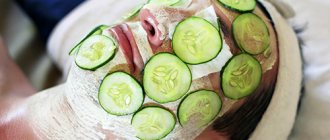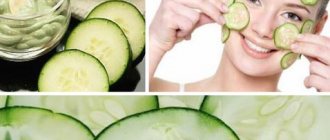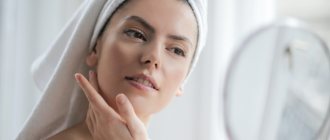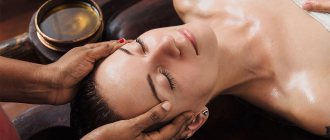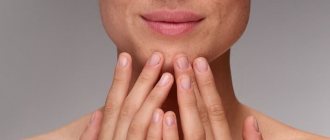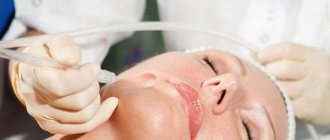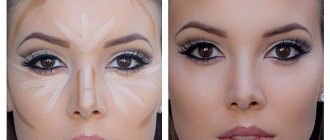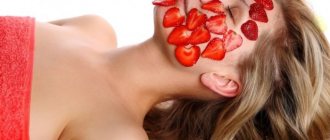Moisturizing facial skin: facts everyone should know
The protective properties of a moisturized epidermis significantly exceed the capabilities of a dehydrated one - with a lack of moisture, the hydrolipid mantle becomes thinner and damaged, the skin becomes vulnerable, sensitive and literally loses its ability to withstand negative external influences. Please note that “dry skin” and “dehydrated skin” seem to be identical concepts at first glance, but there is a big difference between them!
Important(!):
dryness is a genetically determined skin type, the satisfactory condition of which must be maintained with appropriate care. Dehydration is a temporary skin condition caused by irritating factors that can be corrected with proper care. Any skin can become dehydrated: dry, oily, and normal.
Facial skin care treatments
Some types of procedures, which are also in great demand, do not involve exposure to chemicals or special devices. Here are a few of them:
- Manual massage.
Experts in the field of cosmetology say that a competent facial massage can give you excellent skin condition for many years. For the effect to last, it is necessary to repeat the procedure regularly. In general, massage improves skin nutrition and hydration, activates facial muscles, restores correct facial contours, and reduces wrinkles. First, the specialist cleans the skin, and only then proceeds to perform basic manipulations. During the massage, useful ingredients are used. The session ends with a nourishing facial mask.
Massage treatments for the skin produce a healing effect and return your face to a beautiful appearance.
There are several types of this massage:
- Classical. The dermis is affected by soft, smooth movements. As a preventive measure, such a massage will be useful for normal skin in order to maintain muscle tone and facial contours for longer.
- Plastic. The master works on the skin with his hands and also uses various tools and devices. As a result of the massage, swelling is eliminated and facial contours are highlighted. Examples of such massage are lymphatic drainage, sculpture, vacuum, cryomassage.
- Plucked. Useful for eliminating puffiness, acne, comedones, scars.
- Spot. This type of massage activates microcirculation and increases the tone of facial muscles.
Only until January 23rd
Win new prizes in January Discount on massage, body wrap, laser hair removal, and the main prize - IPHONE 13 PRO
Massage helps to keep your face young and toned for a long time better than other skin treatments. It will be useful for those girls whose dermis is prone to wrinkles, has a pale dull color, and does not look fresh. Even without additional care manipulations, the results of massage therapy will be noticeable after one month (four to five sessions). The positive effects of the procedure are improved nutrition, skin hydration, activation of the muscles of the epidermis, visual facelift.
- Spa services.
These sets of procedures allow you to effectively cope with such facial skin problems as environmental influences and the consequences of bad habits. Spa methods include acid treatment, scrubbing, vitaminization, and aromatherapy. Such procedures, performed on a regular basis, will keep your skin beautiful and healthy.
- Salon masks for facial skin.
Most girls take care of their skin with face masks. Many types of them are sold in cosmetic stores: these are chemical, natural, nourishing, moisturizing and other products. Some representatives of the fair sex prefer to make restorative compositions themselves. Facial treatments in the salon using masks are in great demand. Visible results are possible after the first session.
Professional treatments in the studio can be performed once or twice a month. A cosmetology specialist will choose the composition of the mask that suits your skin and the problems present. A positive result will pleasantly surprise all the girls. At the same time, the price of the service is low.
Signs of dehydrated facial skin
Any type of skin can become dehydrated for various reasons:
- Oily and combination skin reacts to a lack of moisture with enlarged pores, increased sebum secretion, excessive oily shine on the face, and acne outbreaks.
- Dry skin reacts with increased sensitivity, peeling, irritation, a feeling of tightness and discomfort appear, facial wrinkles become more noticeable, complexion becomes dull, and the relief becomes uneven.
Dehydration of the skin cannot be determined only by dullness and uneven texture. Tissue dehydration is often accompanied by a feeling of tightness after washing, increased sensitivity, severe flaking, itching, and decreased firmness and elasticity of the epidermis.
How do water losses occur?
Water is lost naturally through the following processes:
- in the processes of excretion in urine and feces;
- breathing - about 500 ml per day;
- through the skin - about 300 ml.
During the summer and during exercise, we lose more water due to increased sweating and breathing.
Skin is very important for water management. Most of the moisture, up to 60%, accumulates in the dermis. The rest is contained in the subcutaneous tissue and epidermis. The closer to the stratum corneum, the less water evaporates. Evaporation is a natural phenomenon caused by the fact that the body is warmer than the environment and we sweat.
Why skin becomes dehydrated: main reasons
A number of factors can provoke skin dehydration:
- Age: the synthesis of the skin’s natural moisturizer, hyaluronic acid, slows down.
- Environment: sudden changes in air temperature, strong winds in the cold season, indoor air dried out by air conditioning, UV radiation.
- Incorrectly selected care for your skin type and needs.
- General dehydration of the body due to non-compliance with the drinking regime.
Dehydration is a temporary condition and if you follow the care recommendations, the skin will regain its tone and vitality.
Some important tips from experts
Cosmetologists recommend following a number of tips when carrying out moisturizing procedures . Useful tips:
- Before applying moisturizer, the skin must first be cleansed.
- Moisturizer must be applied pointwise.
- The cream should not contain alcohol.
- Homemade humidifiers can cause allergic reactions.
- Self-prepared and purchased cosmetic products should be used according to your skin type.
When purchasing a moisturizer, mask or lotion, you must carefully study the composition of the product. The product must not contain toxic substances.
How to moisturize your facial skin: effective methods
You can quickly and easily moisturize your face at home using good cosmetics for dehydrated skin. The main thing is to choose them correctly. At the same time, if there is time and need, mandatory home care can be supplemented with professional procedures from a cosmetologist.
Skin moisturizers at home
To moisturize your skin and prevent it from re-dehydrating, you need to:
1. Regularly and efficiently follow all stages of your daily beauty routine:
- Makeup remover using milk and micellar water.
- Washing with a soft gel or cream.
- Toning the facial skin using toner.
- Moisturizing with serum.
- Applying a moisturizing cream/gel/emulsion selected according to your skin type.
- Use a mask 1-2 times a week for intense, deep hydration.
2. In your arsenal of care products, select moisturizing cosmetics with the ability to prevent the evaporation of moisture from the surface of the epidermis - hydrophilic substances based on active formulas are responsible for this function: hyaluronic acid, hydrolipids, amino acids, minerals, algae and plant extracts, vitamins (A, group B , C, E).
Salon treatments for intense hydration
Before making an appointment with a cosmetologist, consult with your dermatologist about the advisability of a particular procedure and whether you have any possible contraindications.
- Injection and non-injection biorevitalization is a procedure aimed at saturating the cells of the epidermis and dermis with hyaluronic acid (HA) through micro-injections or electrical impulses.
- Injection and non-injection mesotherapy is the second most popular minimally invasive procedure, through which a cocktail of hyaluronic acid, vitamins, minerals, lipids, and amino acids is injected under the skin. Mesotherapy not only moisturizes the skin, but lightens age spots and dark circles under the eyes, smooths out wrinkles, restoring radiance and freshness to the skin.
- Hydropeeling is a deep cleansing and moisturizing 2 in 1. The procedure is aimed at intensive renewal and smoothing of the skin texture and includes three main stages: exfoliation, acid peeling and extraction.
Important(!):
Preparations for salon aesthetic procedures are, as a rule, selected for each client individually, according to the type and characteristics of the skin.
Why is this happening
Loss of fluid, a decrease in its content in the body and epidermal cells, is a pathological condition that is caused by improper drinking regimen, leading to unpleasant changes:
- feeling of tightness;
- the appearance of flaky areas not only on the face, but also on the body;
- deterioration of complexion;
- premature loss of elasticity.
In this article I will tell you how to quickly moisturize very dry skin without conventional creams at home.
Composition of moisturizing cosmetics
The formulas of moisturizers are based on hygroscopic agents that absorb liquid and create a moisture-retaining mantle on the surface of the skin, which softens, smoothes the skin and prevents its dehydration:
- Low and high molecular weight hyaluronic acid;
- Vegetable glycerin;
Important(!):
hyaluronic acid (HA) is the most important component of the intercellular substance of the dermis. HA deficiency causes dryness, loss of tone, and decreased tissue turgor. With age, the synthesis of natural CG decreases (by half by the age of 50), the condition of the skin changes: wrinkles become noticeable, the skin loses its elasticity, and ptosis appears.
Other beneficial ingredients are also often found in moisturizing products:
- Vegetable oils (fats, lipids) restore the hydrolipidic barrier and prevent moisture evaporation.
- Antioxidants prevent oxidative stress and the negative effects of free radicals.
- Allantoin moisturizes, softens the skin, has an anti-inflammatory effect, and promotes regeneration.
- Vitamin B 5 (panthenol) soothes and strengthens the skin.
- Squalene softens the skin and restores the hydrolipid mantle.
- Linoleic acid strengthens the lipid barrier and protects collagen fibers.
- Ceramides slow down transepidermal moisture loss.
- Green algae extract moisturizes and strengthens the protective functions of the skin.
- Thermal water has a pronounced calming, softening effect, strengthens the protective properties of the skin and prevents damage to the lipid barrier.
- Emulsifiers (Glyceryl Stearate, Cetyl Alcohol, Stearic Acid, Glycol Stearate) and stabilizers (Magnesium Aluminum Silicate, Carbomer) are the connecting link for combining all active components in one formula and do not allow them to disintegrate.
Why does the body need water?
When we study our own body, we see skin, feel bones and muscles, know about the existence of internal organs, but rarely does anyone realize that the human body is chemically composed mainly of water. In adults, the percentage of water in the body is 60%, in children - up to 80%.
Water is the main component of cells. It is responsible for transporting nutrients, removing toxins, and regulating temperature, among other things. The exchange of water in the body occurs constantly, and its balance must be maintained, so a person must drink as much as he excretes. This is the only way to prevent dehydration - a condition in which the amount of water is less than the body needs for proper functioning.
Dehydration is usually easy to recognize by dry skin, chapped lips, and constant thirst. Prolonged dehydration is very dangerous. The condition leads to weakness, dizziness, and loss of consciousness. Children lose water much faster than adults.
Dehydration
How to choose a skin moisturizer?
To ensure that the product suits you and has the maximum effect on your skin, when choosing cosmetics, pay attention to several important indicators.
What ingredients are in the composition?
To make sure your skin gets the moisture it needs, be sure to carefully review the product's ingredients to ensure it contains one or more key moisturizing ingredients.
What skin type is the product intended for?
Moisturizing creams for different skin types will differ in the direction of action. Hydration in this case plays an additional function in the basis of the formula; the key components are aimed at correcting the main problems of the type.
For dry skin types
Dry skin needs not only hydration, but also nutrition. Moisturizers, including those that replenish the deficiency of your own lipids, will be a good solution. To do this, the composition must contain ceramides, oils or squalane.
For oily skin types
For oily skin, it is better to choose an intensely moisturizing product with a light texture: gel or fluid. In this case, the product must have sebum-regulating and matting properties. It is very important to choose cosmetics that are non-comedogenic and do not contain mineral oils.
For combined type
Combination skin requires combined care. For the T-zone, choose light textures, possibly with a matte effect. Classic moisturizing products are suitable for the U-zone.
How to keep your skin beautiful and healthy in winter
In our health section, we have already talked about how the skin is a kind of “mirror of the health” of our body. And in order for it to conscientiously perform its many functions, it is necessary to pay special attention to it. Dermatologists from City Clinical Hospital No. 52 talk about the features of skin care in winter
And
.
What problems await our skin in winter? Firstly, the air in the room is dry from heating appliances. Secondly, frost and cold wind outside. Thirdly, a sharp change in temperature when you leave the house to go outside. Not only exposed parts of the body suffer, but also those protected by clothing. Therefore, we will focus on all possible areas of the skin that require close attention in the winter season, and will start with the facial skin that is most exposed to environmental factors.
Face
If we at least somehow protect and shelter all other parts of the body from frost and wind, then the face takes all the blows of winter weather. Under the influence of low temperatures and wind, the skin becomes dry, more sensitive, and wrinkles easily form on it. Low temperatures constrict blood vessels, and the skin of the face lacks nutrients brought by the blood.
Thus, winter facial care should include additional moisturizing and nourishing of the skin, as well as protection from frost and wind.
Moisturizing
After washing and cleansing your face, be sure to use a tonic or lotion - it forms a film that retains moisture in the skin.
In windy winter weather and when playing sports outdoors, you should not use moisturizer. In winter, it is recommended to apply this cream to the face at night, and in the morning, before going outside, use a nourishing one, it will protect against frost. If you use two types of cream of the same brand - moisturizing and night, simply swap them. By the way, in winter, foundation made with a fatty base protects well from the cold.
If you usually used moisturizers for oily skin, then in winter switch to products for normal skin.
If your skin is normal, use moisturizers for dry skin. If your skin is dry, use your usual moisturizer, but 1.5 - 2 times more often than at other times of the year. Nutrition
The nourishing cream applied in the morning should be thick and greasy, and even in our middle zone it should have protection from UV radiation - with a minimum factor of 15 SPF. The cream is applied ten minutes before applying foundation. If you're going on a ski holiday, your morning cream should have a protection rating of at least 30, and preferably 50. The same goes for your lipstick.
Pay attention to products from Russian manufacturers. Facial care products from the factories “Svoboda”, “Nevskaya Kosmetika”, “Black Pearl” take into account the specifics of the climate of the middle zone, which is significantly different from the European one. Also consider cosmetics produced in northern European countries (Finland, Sweden), which take into account the climatic conditions, including our country, and combine components that provide protection and nutrition. Pay attention to the content of 100% natural oils, herbal extracts, vitamins A and E in face cream, including eyelid cream, which are the main active substances: nourish and soften the skin, activate metabolic processes in it, increase elasticity and elasticity. Creams containing emollient components (squalane, rep and avocado phytosterols, macadamia oil, argan, jojoba), oligoelements (zinc and silicon), and essential fatty acids (linoleic and linolenic) will be useful.
LIPS
All the same rules apply to protecting lips in winter. Frost and wind, and especially the habit of breathing through the mouth in the cold, cause peeling of the lips. Therefore, at this time of year, you should always have hygienic lipstick or a special moisturizing balm on your lips. Pay attention to the composition of your winter lipstick: it should be based on beeswax and fat and contain a sun protection factor of at least 20.
If your lips are flaky, use a special lip scrub. At home, it is useful to lubricate your lips with honey or cucumber juice. Vegetable oils - castor, olive, applied for 10 minutes daily are wonderful nourishment for the lips. If desired, you can add a couple of drops of lemon to the oil.
BODY
In winter, no matter how strange it may seem, you should not take a hot shower - only a warm one. Hot water increases heat and water transfer, and the skin dries faster. a long stay in hot water will completely deprive the skin of its protective fat layer, leading to an increase in its dryness. You shouldn’t completely deny yourself the pleasure of soaking in the bath, but you need to remember the duration of the pleasure - no more than 15 minutes, and the water temperature should not exceed 40°C. In winter, do not use regular soap, prefer moisturizing cream soap or shower gel containing cream. Once a week, you can use a body scrub instead of shower gel or before it to remove dead cells from the surface layer of skin. After a shower, use body milk, applying it evenly over the entire surface with massaging movements.
HANDS
The skin of your hands is very delicate; it instantly reacts to lack of care, becoming dry, tight and cracked. The “winter” rule is that you should always wear mittens or gloves outside. You should stop using antibacterial hand cleansers - they lead to dry skin. Try to wash dishes and clean the house only with gloves.
Thick creams are suitable for hand skin care. At night, it’s good to make special masks: apply a thick layer of cream to your hands, put on cotton gloves and do nothing for at least 2 hours (you can go to bed).
LEGS
In winter, you need to take care of your feet even more carefully than in summer. Due to constant contact with woolen fabrics and dense synthetics (socks and tights), insufficient air exchange due to wearing closed shoes, the skin of the feet becomes drier than usual. Hyperkeratosis occurs - thickening of the upper layer of the epidermis and, unfortunately, a regular pedicure does not help in such cases. It is necessary to use daily creams and other cosmetics that contain keratolytics - active substances that soften and remove dead skin (they contain salicylic and lactic acid, urea), as well as foot scrubs (they contain coarser exfoliating components than scrubs for body).
To soften rough skin on the feet, oil wraps help: warm oil (olive, peach or coconut) is applied to the feet, and woolen socks are put on the feet. After 30 minutes, the oil is washed off with warm water. At night you need to use a nourishing foot cream, thicker than in the summer. Before going to bed, it is also advisable to do a foot massage - it relieves fatigue and stimulates metabolic processes in the body. In the morning after a shower, before putting on tights and socks, it is useful to use quickly absorbing moisturizers with a deodorizing effect - to prevent dryness and eliminate unpleasant odors during the day. And take it as a mandatory rule: to allow your feet to “breathe”, change your shoes indoors, change your winter shoes to lighter replacement ones.
HUMIDIFYING FROM THE INSIDE
You also need to take care of moisturizing the skin from the inside, for which you should drink more fluid. It can be plain water, juice, compote. Tea and coffee, on the contrary, promote faster removal of moisture from the body - they should not be abused. The average amount of liquid taken per day in winter should be at least 2 liters.
INDOOR MICROCLIMATE
Winter skin care is not only masks, tonics and creams. This also means maintaining adequate temperature and humidity conditions in the apartment and at work.
To reduce the degree of dehydration and drying of the skin (and this is due to central heating radiators and air conditioning), it is necessary, if possible, to maintain the room temperature at 18-20 ° C and be sure to use air humidifiers (steam humidifiers or ultrasonic water sprayers), especially at night. If it is not possible to use special devices, you can simply pour water into wide containers and place them on window sills or cabinets - the water, evaporating at room temperature, will create an optimal level of humidity.
IF YOU HAVE PROBLEMS
If alarming symptoms occur on the skin or during an exacerbation of chronic skin diseases at any time of the year, dermatologists from City Clinical Hospital No. 52 will come to your aid. You can make an appointment by phone or through the Make an appointment form.
Review of the best La Roche-Posay moisturizers
Night cream-gel Toleriane Ultra
TOLERIANE ULTRA
Intensive soothing care
Relieves tightness and itching, soothing even hypersensitive skin while you sleep.
RUB 1,784 more details
Toleriane Ultra Nuit restorative and soothing night care for the eye area
TOLERIANE ULTRA NUIT
Night soothing care
Intensively moisturizes and soothes the skin, reduces skin sensitivity, restores comfort and tone.
RUB 1,945 more details
Moisturizing face cream for sensitive skin prone to dryness Toleriane Sensitive Riche
TOLERIANE SENSITIVE RICHE
Moisturizing care
Instantly moisturizes, soothes, softens the skin, protects against external factors.
RUB 1,058 more details
Moisturizing mattifying sebum-regulating emulsion Effaclar Mat
EFFACLAR MAT
Sebum-regulating emulsion
The product with thermal water, glycerin, zinc and sebulise mattifies the skin, reduces oily shine, tightens pores and moisturizes well.
RUB 1,618 more details
Moisturizing your hands
The skin of the hands is constantly exposed to the negative effects of external factors (dry air, temperature changes, ultraviolet radiation) and often comes into contact with water, so it needs constant care.
To avoid hand skin problems, follow these simple rules of proper care:
- use protective gloves for contact with detergents;
- wash your hands with moisturizing soap;
- blot washed hands with a towel; do not dry your skin in the air or in the sun;
- in frosty and windy weather, be sure to wear gloves;
- To moisturize the skin of your hands several times a day (preferably every time after contact with water), use products with oils, hyaluronic acid, glycerin, and collagen. Hydro Active hand moisturizing cream will give comfort and softness even to dehydrated, dry or aging skin;
- To quickly restore very dry skin on your hands, use paraffin therapy. It can be performed in the salon and at home using professional paraffin therapy cosmetics.
The paraffin therapy procedure lasts 20 minutes and gives quick and noticeable results. The skin of your hands becomes well-groomed and velvety
Prevention of skin dehydration
Let us highlight the main directions for preventing skin dehydration:
- Use products that normalize the hydrobalance of cells and prevent moisture evaporation.
- Choose care cosmetics that suit your skin type.
- Moisturize not only the upper layer of the epidermis, but also the deep layers of the dermis - choose products with intense hydro-formulas and hydrofixatives in the composition.
- Protect your skin from UV radiation daily: dry, sensitive skin is most susceptible to the negative effects of ultraviolet radiation and, as a result, photoaging.
- Maintain drinking regime. The daily norm of clean water will nourish the cells with moisture from the inside, and corrective care will do the rest of the work.
- Eat a balanced diet, this will protect you from hypovitaminosis and possible dry skin.
Important(!):
starting from the age of 25, the process of cell regeneration slows down, the skin texture becomes less uniform, the epidermis thickens, and the complexion acquires a dull, earthy tint. Moisturizing components are not able to penetrate the dense stratum corneum of the skin, thereby not reaching the dermis and not fully affecting the cells.
For moisturizing care to work fully, take care of high-quality and deep cleansing: in addition to daily delicate cleansing, include an exfoliation procedure in your beauty routine. It is enough to use a soft scrub, gentle peeling or gommage 1-2 times a week to speed up cell renewal and improve their ability to absorb active substances.
Reasons for the problem
I have already mentioned one thing - lack of water leads to dehydration. We drink little, and the epidermis, like the entire body, does not receive the daily norm that it is supposed to.
Another factor influencing the condition of our face and body is nutrition. If our diet is correct, healthy, balanced, we see only radiance, smoothness, elasticity - all the components of healthy and beautiful skin. A meager menu, constant diets or eating on the run, a love of fast food cause dryness, irritation, peeling, and tightness. Taking diuretics and fasting can lead to the same consequences.
Dehydration is also a consequence of poorly selected cosmetics and improper care.
Also on the list of reasons are:
- The influence of air conditioners, which make the skin more vulnerable, dry out and dehydrate the epidermis.
- Frequent visits to solariums, prolonged exposure to direct sunlight.
- Lack of proper sleep.
- Neglect of one's own well-being.
- Nervous tension.
- Smoking.
How do you know if your skin is dry and needs emergency care? Signs of dehydration are:
- Feeling of tightness, flaking
- Change in complexion
- The appearance of small wrinkles on the cheeks, around the eyes, on the neck
However, do not confuse dehydrated skin with dry skin. The latter became like this to a greater extent due to hereditary predisposition, and in the first case external factors led to troubles.
Even oily and shiny areas can be dehydrated - there is nothing unnatural about this. They also need hydration - special, extremely delicate.
We are dealing with a serious problem that can be faced by owners of all skin types - from sensitive skin, which reacts sharply to any changes, to problematic skin, prone to the appearance of comedones and acne.
I advise staying hydrated.
- Drink more water. This is a condition for the proper functioning of the intestines, its cleansing, acceleration of metabolism, removal of waste and toxins. This is also an ambulance for the epidermis, whose cells need regular saturation with moisture.
- Eat right. Your diet should be dominated by fruits and vegetables, not fatty, fried, spicy, processed foods, and pickles. Give preference to foods that are steamed or baked in the oven. It is advisable to minimize heat treatment of products in order to preserve vitamins, minerals and trace elements in them.
- Do not overuse the solarium; before going to the beach or walking on a hot summer day, lubricate your skin with a special sunscreen or lotion.
- Use the right care products - professional liposomal cosmetics based on natural ingredients, which ensure the delivery of active substances to the deep layers of the epidermis.
These tips are relevant for everyone - both those who first encountered the problem due to a change in diet or improper drinking regimen, and those who have been struggling with dryness, tightness and flaking all their lives.
Composition of thermal water
In cosmetology, there are three types of biological water that meet different skin needs: hypotonic, isotonic, hypertonic. All three types differ in their mineral composition, set of healing components and their beneficial properties.
- Hypotonic
Hypotonic water has a slightly mineralized composition: the content of trace elements is less than 9 mg/l. This type of thermal water is considered the softest due to its low salt content and is suitable for reactive, sensitive skin: it effectively relieves inflammation, irritation and does not cause dryness. - Isotonic
The concentration of mineral substances in the water composition is 9-11 mg/l, which is comparable to the level of salt content in skin cells and tissue fluids. This cosmetic product has a neutral pH (neutral acidity), soothes and tones the skin. The product is universal and suitable for any skin type, mainly used for the care of normal and dry skin. - Hypertonic
Hypertonic water has a highly mineralized composition: the content of trace elements is more than 11 mg/l. This type of thermal water absorbs sebum well, reduces oily shine on the face and is suitable for caring for oily and problem skin types. Helps balance the acid-base balance of the skin associated with the oxidation of excess sebum, improves cell metabolism, prevents the development of pathogenic flora and acne relapses.
Fighting deep wrinkles
Deep wrinkles are a clear sign of old age. They occur when the synthesis of collagen and elastin is reduced and the activity of connective tissue cells decreases. Dermatologists will tell you how to care for your skin after 40 years and smooth out wrinkles.
The fact is that for deep wrinkles it is no longer enough to simply use cream, but I would like to preserve the youth of my face. In this case, injection and hardware therapy methods are used:
- Botulinum therapy (Botox) is a neurotoxin; it blocks the transmission of nerve impulses to the muscle, and it stops contracting, and the wrinkle is smoothed out.
- Contour plastic surgery involves the use of gel preparations and hyaluronic acid. They are injected into the deep layers of the skin, thereby adding volume and smoothing out wrinkles.
- Plasma therapy is a shallow injection of the patient’s own blood plasma under the patient’s skin, this eliminates signs of skin aging and provides a lifting effect.
Hardware methods are an ideal solution for those who are afraid of the consequences of injections or have contraindications; they are no less effective and safe. Often used by cosmetologists are thermal lifting and laser resurfacing.
